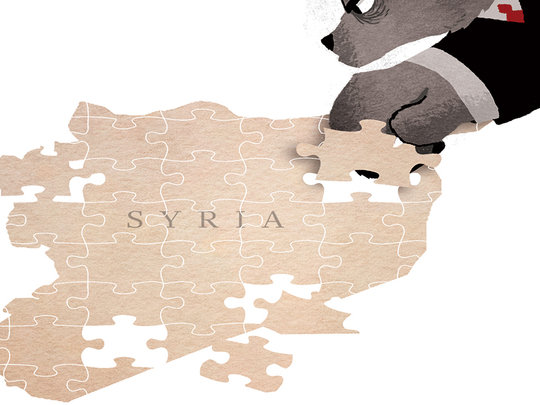
By hosting the negotiations on the Syrian conflict in Moscow last week, Russia clearly pulled the rug from under the feet of western countries and the Syrian National Coalition forces they back, which want to see president Bashar Al Assad removed from office before they sit down at the negotiating table.
It has to be said the four-day exploratory meetings of the 32 opposition members from inside the country and the seven-member Syrian government delegation, face-to-face, is a diplomatic master-stroke by the Kremlin — a triumph that can have lasting consequences. In one fell swoop, Russia appeared to have changed the rules of the game, while at the same time portraying itself as an honest broker trying to establish peace in the region and get rid of foreign terrorists and end the civil war in Syria.
The image is being thrust at the forefront because, through patient persuasion and tedious shuttling between Moscow and Damascus, Russia drew up different political parties and groups from a fractured, bickering and at times cut-throat opposition to sit with government delegates and iron out a politically viable deal — not today, tomorrow or next week but in the coming months.
In another way, the Russian government, long-term friend of Syria and which regards the Levant as being within its traditional sphere of influence, just like in Cold War times, was able to make the parties sit together in a friendly atmosphere not in Syria, not in the Arab world where Egypt traditionally plays host to negotiations, but in Moscow.
Many in the Obama administration and the European governments already gave the talks the thumbs down before they even started — despite fighting Daesh (Islamic State of Iraq and the Levant) in central and northern Syria, while implicitly turning a blind eye to the excesses of the regime. Russia, though, is playing a different game.
The fact that the parties are going to meet again in Moscow next month is pricking the ears of many western politicians as the political initiative is increasingly moving to the East, and instead of sidelining Moscow, its leadership is again playing a central role in international policymaking. A “window of opportunity”, no matter how tenuous it is, could just open up to create Syrian reconciliation, regardless of the fact that important opposition forces are yet to agree to the Moscow meetings.
This window of opportunity much favours Moscow, as it is the case with the so-called politics of the moment as Russia is probably feeling pleased with itself on many levels. It brought Syrian antagonists to rub shoulders with each other, it created a relatively safe haven for political networking and diplomatic chit-chat and, at long last, got something moving between the Syrian government and the opposition forces and created the potential to revert a bleak, bloody, destructive, hopeless future into, just maybe, a viable one.
‘10 Moscow principles’
Although it is under no illusions that the road ahead is still difficult with many pitfalls, Russia is pleased because the talks that just ended established the so-called “10 Moscow principles” — a list of basic provisions agreed upon by the government and the opposition related to supporting Syrian sovereignty and territorial integrity, fighting against external terrorism, outside intervention, stopping barrel bombing, setting free women and children, humanitarian aid, setting up a human rights organisation and so on.
This may mean a firm commitment by the different parties to submit to an agreed status quo, wherein the Baath party would continue to be in power under a different political formula to be agreed upon. These principles effectively mean that a modicum of an agreement, no matter how tentative, is being forged, which is what Russia wants to reach so as not to rock the boat too much in a region where its political and strategic roles may be affected and it may be reduced to a far lesser power than it already is. Add to this the fact that it is already being shunned for its role in Ukraine.
The “palatial atmosphere” in Moscow is already being given a thumbs up, which effectively means a “dialogue infrastructure” is being built for more meetings where substantive issues can be argued, debated and ironed out and where there is an increasing chance of a wider opposition, particularly the western-backed one, joining the process.
This seems to suggest that Russia — under its President Vladimir Putin, its proactive Foreign Minister Sergey Lavrov and top Moscovite officials — is looking for a long-term exit strategy from the Syrian quagmire that will satisfy everyone. At the same time, Moscow is being careful not to step on the toes of the United Nations, which it sees — outwardly at least — as the umbrella for ending the conflict, as seen during the Geneva I and II talks, which, despite being unsuccessful, have have established the basis for ending the conflict.
Marwan Asmar is a commentator based in Amman. He has long worked in journalism and has a Phd in Political Science from Leeds University in the United Kingdom.












